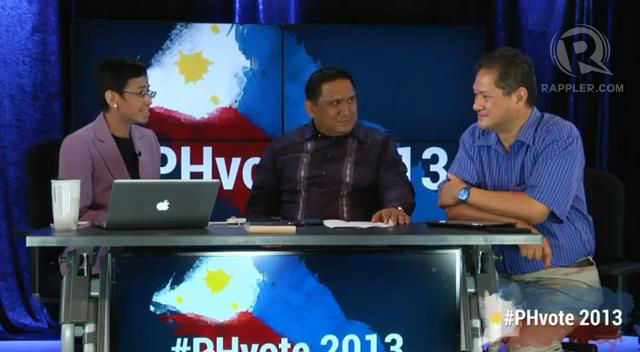SUMMARY
This is AI generated summarization, which may have errors. For context, always refer to the full article.

MANILA, Philippines – For the first time in a long while, the Commission on Elections (Comelec) set its foot down with regard to electoral reforms, and this has left a good impression not only on the candidates, but on the voting public as well.
This was the assessment of Dean Tony La Viña of the Ateneo de Manila University-School of Government and political science professor Ranjit Singh Rye of the University of the Philippines-Diliman, who spoke with Rappler CEO Maria Ressa in the afternoon of election day, May 13.
The professors said the Comelec’s firmness on various policy experiments will encourage change in the overall attitude of both the voters and the candidates.
La Viña lauded the Comelec for actively managing the elections instead of just watching from the sidelines. He pointed out, however, that the country is not yet fully developed when it comes to the management of automated elections.
“If the technology used in the elections should prove to be faulty, then Comelec should not be defensive but should change come 2016 elections,” La Viña added.
Rye said that since Comelec’s actions have a big effect on the behavior of the voters, the cancellation of the canvassing of senatorial votes merely minutes after the polls closed was not only anticlimactic. He said this might also have an effect on the credibility of the poll body and the election results.
“People might be afraid that the votes could be marred by uncertainties,” he said.
Still, said Rye, majority of the voters still see the elections as a tool for empowerment.
“While the people understand that the elections are flawed, they also understand that this is a political opportunity to hold their leaders accountable and put forth their claims as far as transparency and credibility is concerned,” he added.
In the light of the automated elections, La Viña pointed out that people particularly the voters should never overestimate or underestimate the power of social media, and that social media also has the capacity to backfire on its users.
An example of this is Nancy Binay, who was placing in the top 5 of the unofficial election results despite various attacks on her skin color and her qualifications.
On the issue of political dynasties, La Viña said that “the best way to end political dynasties is to have good dynasty members to take over.” Rye also added that if nothing can beat these dynasties, then the people must hold them accountable for their actions.
La Viña and Rye agreed that the best form of intervention is voter education, also through social media.
“The more people are able to participate via Information Communication Technology (ICT), then the process of democracy would be easier,” La Viña added. – Rappler.com
Add a comment
How does this make you feel?
There are no comments yet. Add your comment to start the conversation.